Unit 10 You’re supposed to shake hands 单元课件(121张 无素材)
文档属性
| 名称 | Unit 10 You’re supposed to shake hands 单元课件(121张 无素材) |
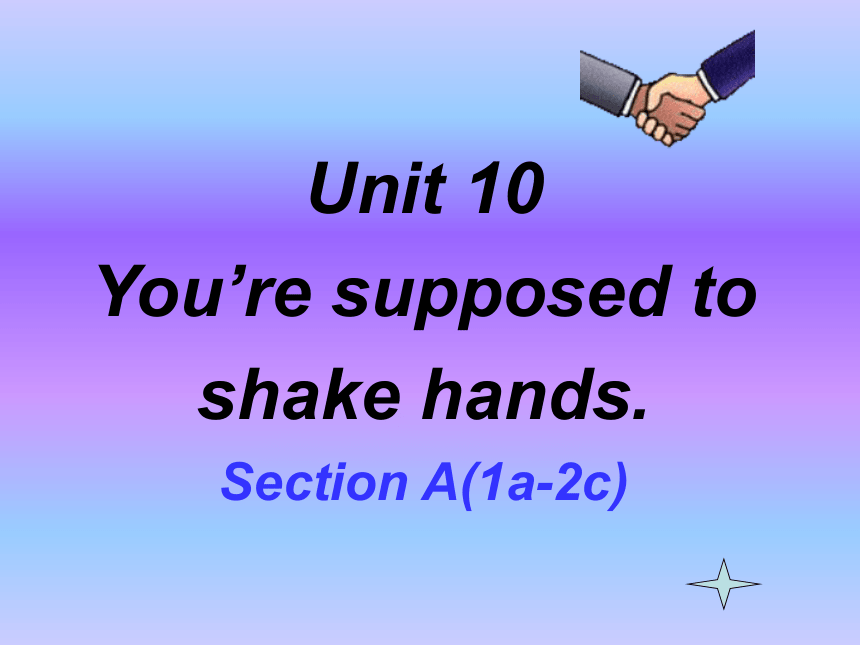
|
|
| 格式 | zip | ||
| 文件大小 | 3.0MB | ||
| 资源类型 | 教案 | ||
| 版本资源 | 人教新目标(Go for it)版 | ||
| 科目 | 英语 | ||
| 更新时间 | 2020-01-10 00:00:00 | ||
图片预览

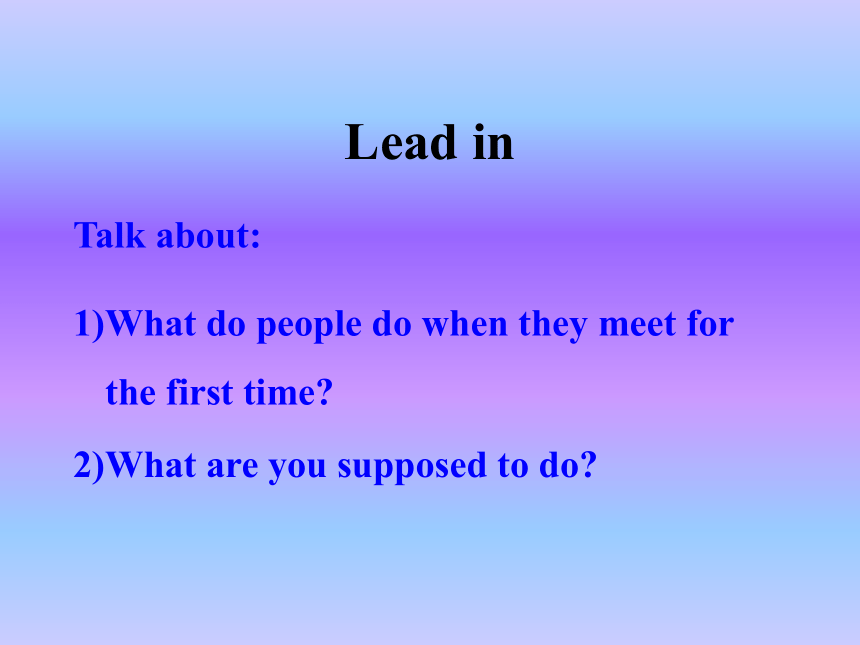


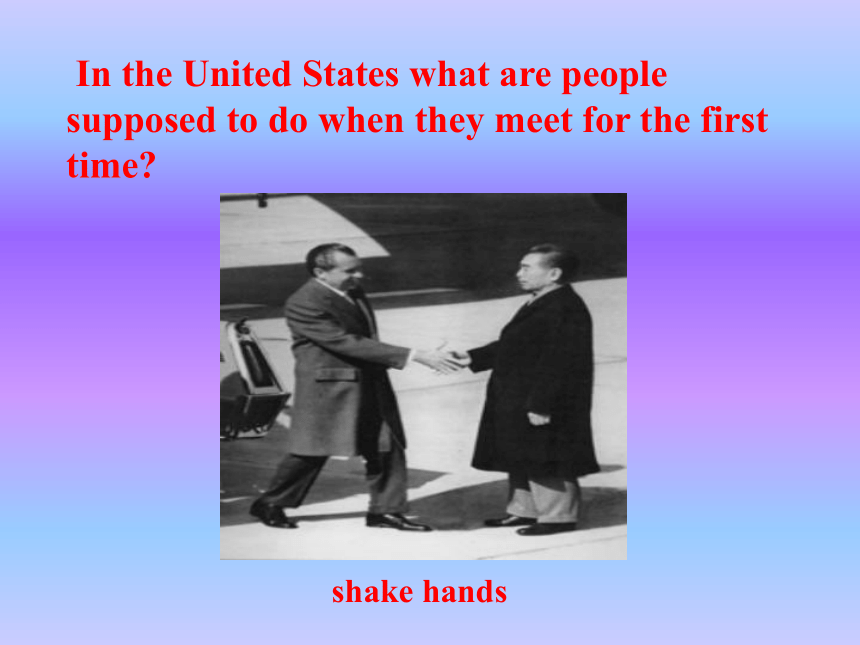
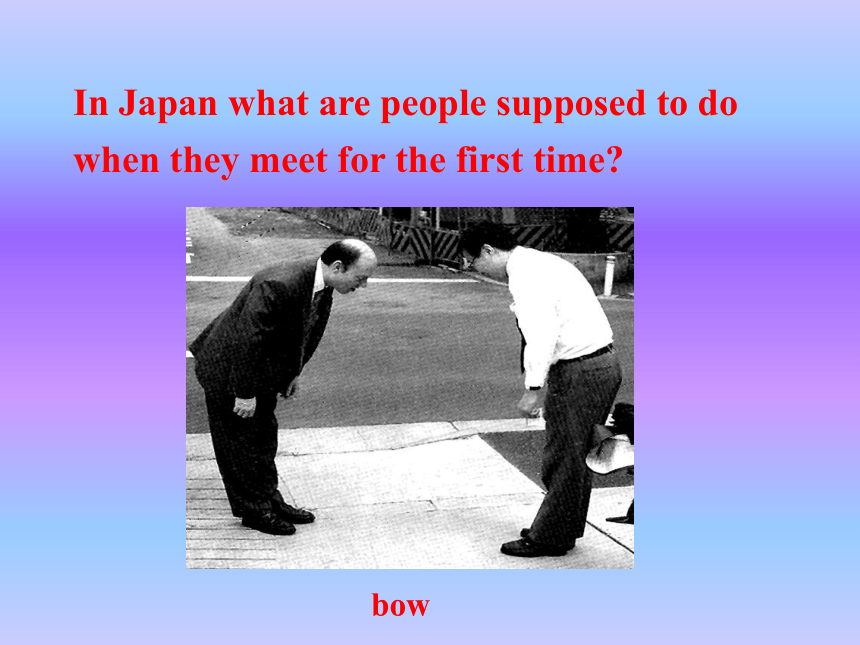
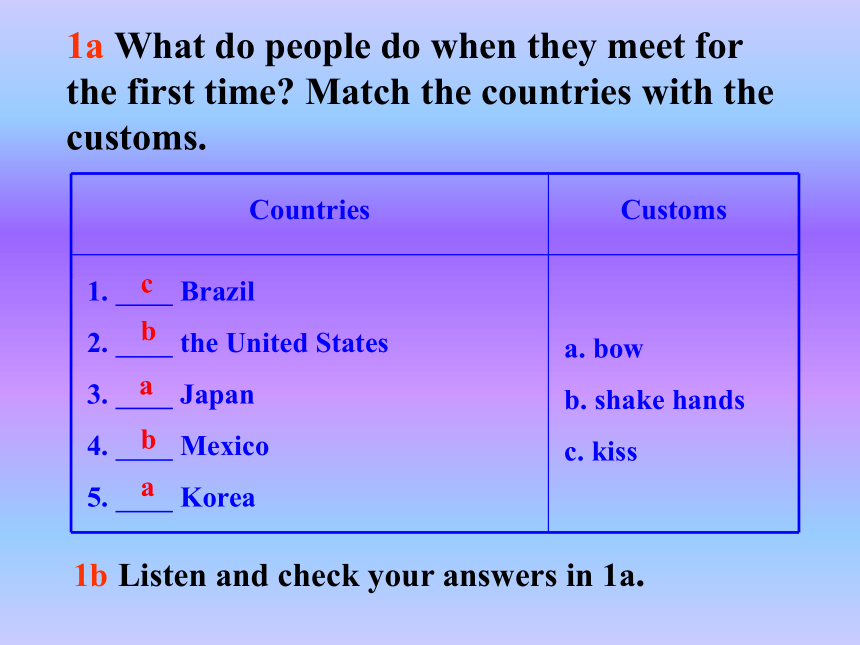
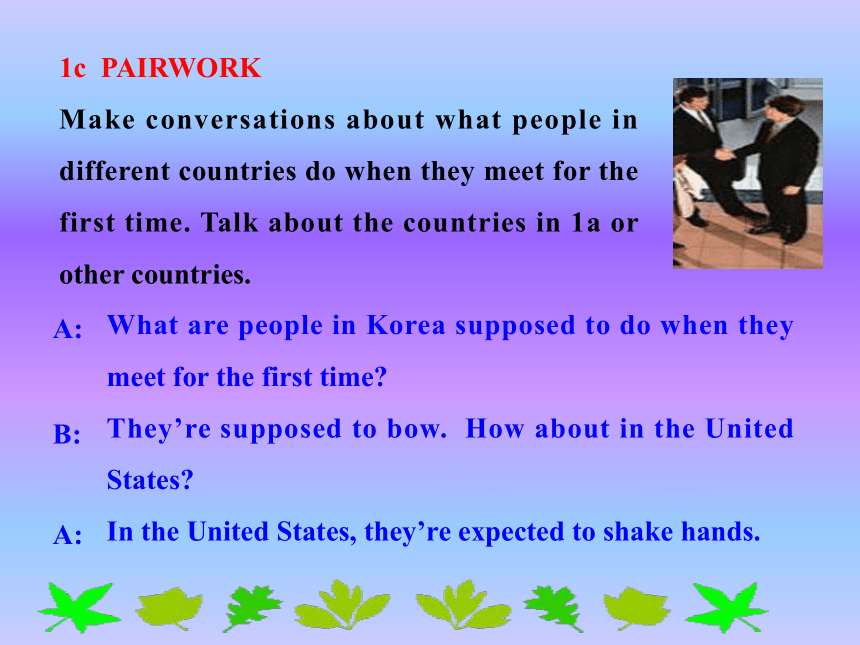
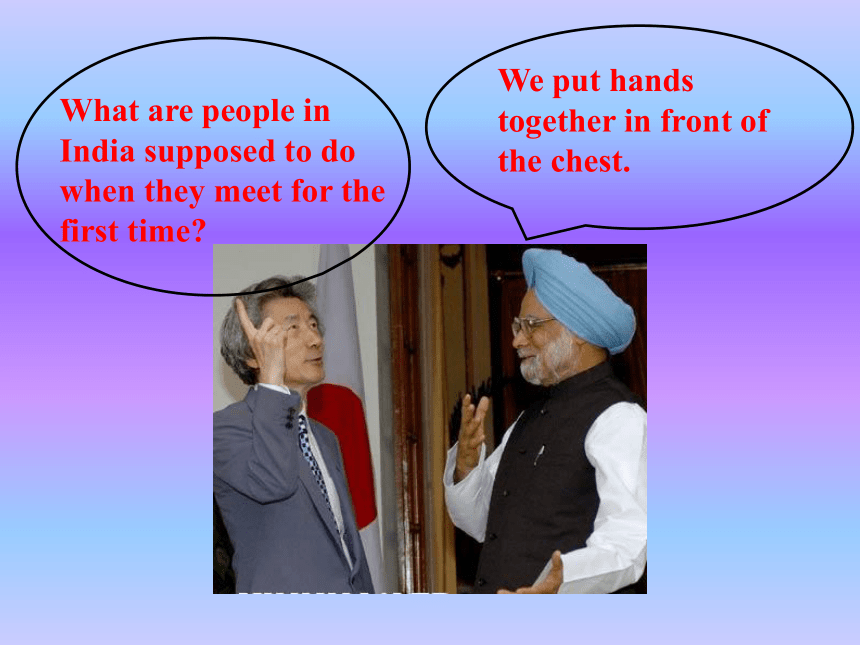
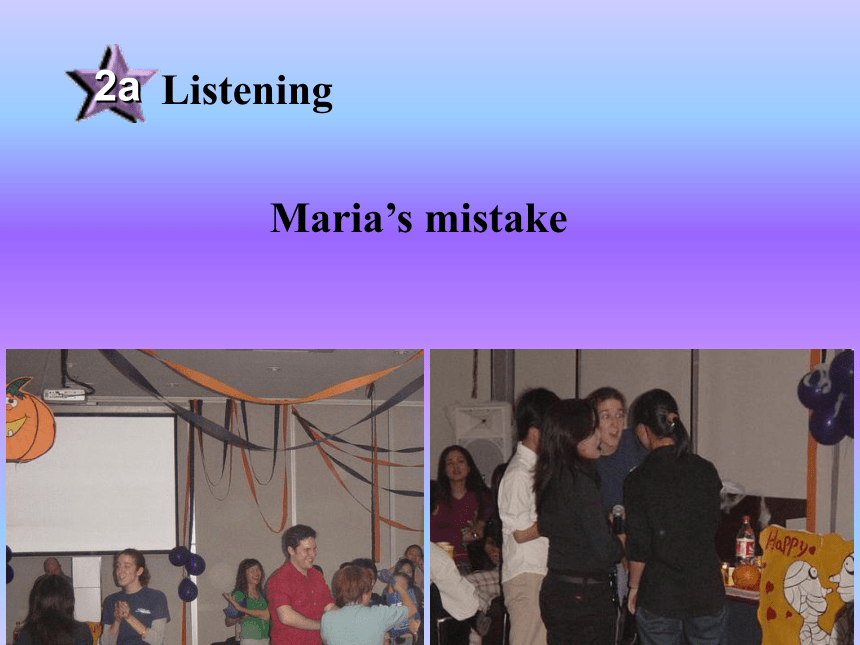
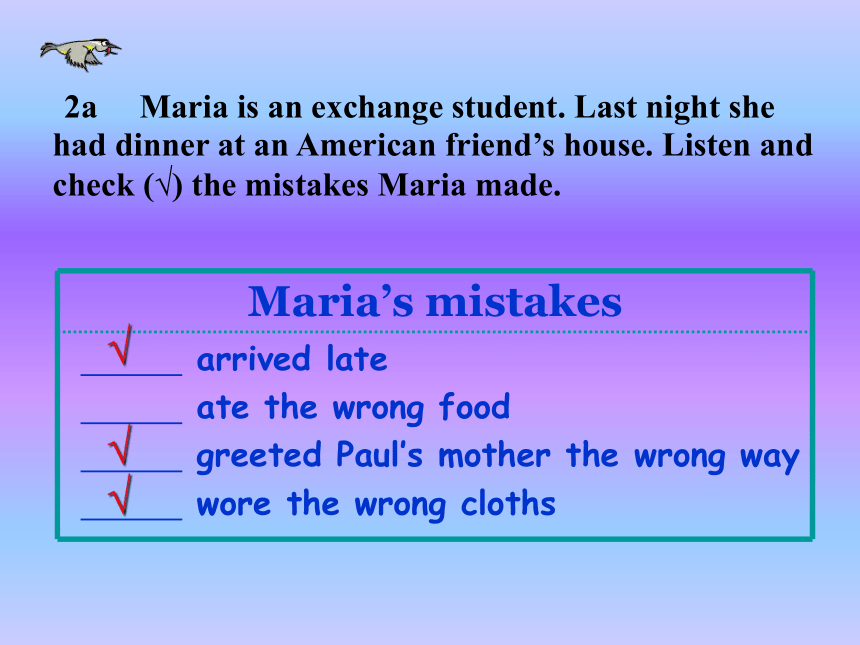
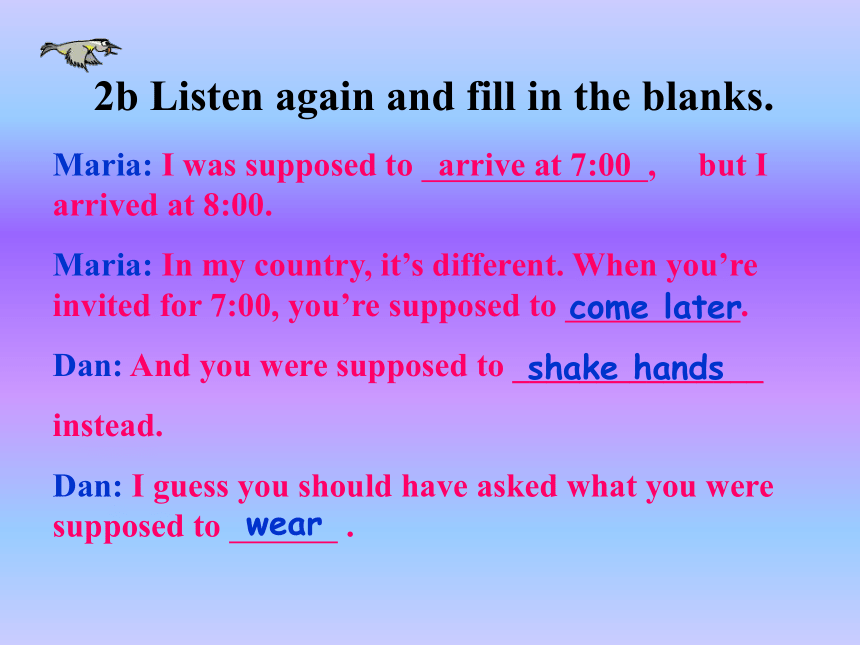
文档简介
课件121张PPT。Unit 10
You’re supposed to shake hands.
Section A(1a-2c)Lead inTalk about:
What do people do when they meet for the first time?
What are you supposed to do? Different countries have different cultures. Lead inWhat are people supposed to do in Brazil
when they meet for the first time? kiss In the United States what are people supposed to do when they meet for the first time?shake handsIn Japan what are people supposed to do when they meet for the first time?bow1a What do people do when they meet for the first time? Match the countries with the customs.cbaba1b Listen and check your answers in 1a.1c PAIRWORK
Make conversations about what people in different countries do when they meet for the first time. Talk about the countries in 1a or other countries.What are people in Korea supposed to do when they meet for the first time?
They’re supposed to bow. How about in the United States?
In the United States, they’re expected to shake hands. A:B:A:We put hands together in front of the chest.What are people in India supposed to do when they meet for the first time?2aMaria’s mistakeListening 2a Maria is an exchange student. Last night she had dinner at an American friend’s house. Listen and check (√) the mistakes Maria made.√√√2b Listen again and fill in the blanks. Maria: I was supposed to arrive at 7:00 , but I arrived at 8:00.
Maria: In my country, it’s different. When you’re invited for 7:00, you’re supposed to .
Dan: And you were supposed to _______________
instead.
Dan: I guess you should have asked what you were supposed to .come latershake handswearTapescriptDan: Hi, Maria. How was Paul’s Party?
Maria: Oh, Dan, It was a disaster.
Dan: It was?
Maria: Uh-huh.
Dan: What happened?
Maria: Well, I was supposed to arrive at
7:00 ,but I arrived at 8:00.
Dan: Oh, so you were late. Maria: Yeah, but In my country, it’s
different. When you’re invited
for 7:00, you’re supposed to
come later!
Dan: I see.
Maria: Then when I met Paul’s mom, I
kissed her.
Dan: And you were supposed to shake
hands instead.
Maria: That’s right. And I wore a fancy
dress.Dan: What’s wrong with that?
Maria: Well, it was a barbecue, Dan.
Everyone else was wearing a
T-shirt and jeans.
Dan: I guess you should have asked
what you were supposed to wear.greet = to welcome or say
hello 作动词, 意为“问候,打招呼”。
He greeted her by saying “good morning”.
他向她打招呼说 “早上好”。ExplanationShe greeted me with a friendly smile. 她向我微笑致意。
A beautiful view greeted us.
美丽的景色呈现在我们面前。Role play the conversation between Maria
and Dan.How was the dinner at Paul’s house last night?
Well, it was OK, but I made some mistake. I was supposed to arrive at 7:00, but I arrived at 8:00.A:B: 2C PAIRWORKUnit 10
You’re supposed to shake hands.
Section A(3a-4c)3a ReadingWe are pretty relax about time.We often just drop by our friends’ homes.We don’t have to make
plans when we get
together with friends.It’s very important to be on time.We never visit a friend’s house without calling first.We usually make plans to meet friends.What kind of rules do you have in Colombia?Well, they have pretty relaxed rules. Like what?Well, it’s OK if you’re not on time. 3a Where I’m from, we are pretty relaxed about time.地点状语从句对…很随意 If you tell a friend you are going to their house for
dinner, it’s okay if you arrive a bit late.
在我的国家人们对时间观念较随意。晚一点到达条件状语从句条件状语从句 Spending time with family and friends is very
important to us.动名词短语做主语陪伴家人和朋友 We often just drop by our friends’ homes .= visit We don’t usually have to make plans to meet our
friends . = 动词 plan同义句: Usually we ______ _______ to ______
to meet our friends .aren’t supposed plan Often we just walk around the town center,
seeing as many of our friends as we can .逛逛市中心,=hang out around… 尽可能多地见见朋友分词短语做状语In Switzerland :守时钟表之国迟到十五分钟一起外出娱乐be on timethe land of watches毕竟;终究after allfifteen minutes latedo something interestinggo somewhere togetherI don’t know why you’re so worried . It isn’t your problem after all .So you see, I was right after all .Role play the conversation between Teresa
and Marc.What kinds of rules do they have in
Colombia?
Well, they have pretty relaxed rules.
Like what?
Well, it’s OK if you’re not on time.A:B:3b PAIRWORKA:B:4 PAIRWORKIn China, what is supposed to do in these following situations?1. greeting teachers say, “Good morning.”2. doing homework 3. phoning someone 4. visiting someone’s
place call first, and knock
at the doorat home or in school
after classsay, “Hello, I’m….”5. making plans with
friends PAIRWORKIn China, what is supposed to do in these following situations?6. being on time 7. giving gifts Discuss the plan, call
to make changes.Always on time or
litter early.Festival gifts being
necessary.Unit 10 You’re supposed to shake hands.
Section B(1a-2c)
Table MannersThere are many table manners
around the world. But different
countries have different culture.
…In the United States, you’re not supposed to eat with your hands.In PeruYou are not supposed to talk at table. In China, you’re not supposed to pick up your bowl of rice.In Korea, the youngest person
is supposed to start eating first.In Brazil, you should wipe your mouth with your napkin every time you take a drink.2a Listening2432b Listen and match these sentence parts.You aren’t supposed to…
It’s polite…
It’s rude…
You shouldn’t…b. to stick your chopsticks into your food.a. to make noise while eating noodles.d. eat or drink while walking down the street.c. point at anyone with your chopsticks.—1.You aren’t supposed to
__2.It’s polite…
__3.It’s rude…
__4. You shouldn’t…2b ListeningabcdTapescriptSatoshi: You must be really excited about
leaving for Japan tomorrow, Steve!
Steve: Yeah, I am. But I’m a little
nervous, too.
Satoshi: Nervous about what?
Steve: Well, for one thing, I don’t know
how to use chopsticks very well…
and I don’t know how to behave at
the dinner table. Satoshi: Oh, I see. I could give you a
little lesson on Japanese table
manners if you’d like.
Steve: Really? That would be great!
Satoshi: Hmmmm. Let me see. One
difference is that sometimes it’s
polite to make noise when you’re
eating. Especially when you’re
eating noodles. It shows that you
like the food.Steve: Really? That’s interesting. In the
United States you’re not supposed
to do that.
Satoshi: Yeah, I know. OK, so here are
some chopstick rules: it’s rude to
stick your chopsticks into your
food. And you shouldn’t point at
anyone with your chopsticks.
Steve: Oh, OK. I won’t.
Satoshi: And also, this isn’t about table manners exactly, but you should
know that it’s rude to eat or drink
while walking down the street.
Steve: Huh.
Satoshi: Oh, and the most important
thing you need to know is that
you’re not supposed to talk
when you’re eating dinner. Only parents are allowed to
talk at the dinner table.
Children are not allowed to
speak.
Steve: Wow! That’s …that’s unusual!
Satoshi: I’m just kidding! Steve! 1. In China, you’re not supposed to pick up your bowl of rice.
在中国, 你不应该端起你的饭碗。
pick up “捡起; 拾起; 拿起”。Explanations
A girl picked up a wallet on her way home.
一个小女孩在回家的路上捡到了一个钱包。
The phone stopped ringing just as I picked up the receiver.
我一拿起听筒, 电话就不响了。2. In Brazil, you should wipe your mouth with your napkin every time you take a drink.
在巴西, 每次喝完东西后你应该用餐巾
纸擦嘴。
wipe 作动词 意为 “擦,擦去” 常与away,
off, up 连用,表示“擦干净’’。
Wipe the dirt off your shoes.
抹去鞋上的污泥。
Wipe up the milk you spilled, please.
请抹掉洒出来的牛奶。3. …to stick your chopsticks into your food.
把筷子插入你的食物中。
(1) stick 动词, “刺;插入”
Stick a fork into the meat to see if it’s
ready.
将叉插进肉里看熟了没有。 I can’t move. There’s a piece of wire
sticking in my leg.
我动不了, 有一根金属丝刺进我的腿
里了。
(2) chopstick 是由 “chop(砍)+stick(棍子)组成的合成词。意思是 “筷子” 它通常以复数形式出现。
Our Chinese always use chopsticks to eat, but the English don’t use them.
我们中国人通常用筷子吃饭, 而英国人不。4. It’s rude to point at anyone with
your chopsticks.
用你的筷子指着别人是很不礼貌的。
rude 作动词,意为“粗鲁的; 无理的”
常用短语be rude to sb, 意为 “对某
人无理”。It’s rude to interrupt when people are speaking.
打断人家的话是不礼貌的。
I think it was rude of them not to phone and say that they weren’t coming.
他们来不了, 也不打电话通知一声, 太
不像话了。point 是一个动词,意思是 “指, 指向”。
它构成的词组” “point at”意思是 “指
向” “对准”。
“I’ll have that one.” She said, pointing at a big chocolate cake.
“我想要这个。”她指着一块大的巧克
力蛋糕说。 2C PAIRWORKA: We’re supposed to …
B: Yes, and it’s rude to …You aren’t supposed to eat or drink while walking down the street. It’s polite to make noise while eating noodles. Unit 10
You’re supposed to shake hands.
Section B(3a-4d)Table manners(餐桌礼仪) in JapanIt’s polite to make noise while eating noodles.It’s rude to stick your chopsticks into your food.You shouldn’t point at anyone with your chopsticks.You aren’t supposed to eat or drink while walking down the street.What table manners do you know in China?1.We shouldn’t point at others while
eating the meals.
2.We aren’t supposed to make noise
while eating the meals.
3.We shouldn’t talk with each other
loudly at the table.
4.It’s rude to wipe our mouth with our
hands after meals.
5.It’s polite to wipe our mouth with
the napkin.
…Wang Kun's experience in FranceReading--answer questions1.Why was Wang Kun nervous before she arrived in France?
2.Why did she have no reason to be nervous?
3. How has her French improved?
4.What does she find surprising?
5.What is one particular challenge she is facing?Because her French was not very good. Because her host family was really nice. You put your bread on the table, not on the plate.One particular challenge is learning how to behave at the dinner table.She is very comfortable speaking English now.( )1. It’s rude to say you’re full.
( )2. It’s polite to put your bread on your plate.
( )3. It’s rude to eat fruit with your hands.
( )4. It’s polite to say it’s delicious.
( )5. It’s polite to put your hands on your lap.
( )6. It’s polite to put your elbows on the table.Table manners in France T or FTFTTFF1.Wang Kun is having fun on his exchange program in France. ( )
2.It’s worse than he thought it would be. ( )
“It’s even better than I thought it would be.”
3. Although his French has improved, Wang Ku still dislikes speaking French. ( )
True or FalseFFReadingT“And you wouldn’t believe how quickly my French has improved. I’m very comfortable speaking French now.”
4.He likes his host family, because they are friendly to him. ( )
5.Things in France is quite different from the way at home. ( )
6.Wang Kun hasn’t been used to things in France. ( )True or FalseFTReadingT“I find it difficult to remember everything, but I’m gradually getting used to things .”
be /get used to sth. 习惯于某事Dear Laura,
Thanks for your message. Yes, I’m having a
great time on my exchange program in France.
It’s even better than I thought it would be. I was
a bit nervous before I arrived here, but there
was no reason to be. My host family is really
nice. They go out of their way to make me feel
at home. And you wouldn’t believe how quickly
my French has improved! I’m very comfortable
speaking French now. Although I still make lots
of mistakes, it doesn’t bother me like it used to. My biggest challenge is learning how to behave
at the dinner table. As you can imagine, things
are really different from the way they are at home.
For example, you’re not supposed to put your
bread on your plate. You’re supposed to put it
on the table! I thought that was pretty strange at
first, but now I’m used to it. You’re not supposed
to eat anything with your hands except bread,
not even fruit! (You have to cut it up and eat it
with a fork.) Another thing is that it is very rude to say you’re
full. If you don’t want any more food, you should
just say, “It was delicious.”Also, it’s rude to put
your hands in your lap.You should always keep
your hands, but not your elbows,on the table. I
have to say, I find it difficult to remember
everything, but I’m gradually getting used to
things and don’t find them so strange any more.
I’ll write soon and tell you more about life in
France. Hope you’re having a good school year.
Wang KunNew Wordsget out of one’s way to do sth.
特地(不怕麻烦地)做某事
make sb. feel at home 使某人感到宾至如归
be/get used to 习惯于……
fork 叉;餐叉 lap 大腿
elbow 肘部 occur 发生
gradually 逐渐地 particular 特殊的
They go out of their way to make me feel at home. 他们尽力让我感觉自在。(1) go out of one’s way to do sth 竭尽全力/尽力做某事,想尽办法做某事Rose 竭尽全力来帮助Tom学英语.Rose goes out of her way to help Tom with his English.(2) feel at home 感觉在家(一样);感觉自在
I thought that was pretty strange at first, but now
I’m used to it.
开始,我想那是太奇怪了,但是现在我已经习惯了。I’m getting used to the school life here.
我开始习惯这里的学校生活。
She gets used to talking in English.
她习惯用英语交谈。
He will get used to getting up early.
他将习惯于早起。get/be used to 意为 “习惯于…”begetused to + 宾语 “习惯于…”used to + (do)动词原形 “过去常常做…”I thought that was pretty strange at first . But now I’m used to it .起初我认为那很奇怪,可现在我已习惯了。I found it difficult to remember everything , but I’m gradually getting used to things .我觉得记住所有的礼节太难了,但我正逐渐适应。I wasn’t used to such cold and windy weather.The building used to be a hotel .Did you use to see each other ?Although I still make lots of mistakes, it doesn’t bother me like it used to.I find it difficult to remember everything. 我发现很难记住所有事情。该句结构为“主语find it adj to do sth”,意为“发现做某事怎么样”.其中“it”是形式宾语,adj.是宾语补足语,to do sth是真正的宾语.带有形式宾语的常见动词有think, find, know, believe, feel 等.We find it easy to learn swimming.Teenagers find it interesting to play computer games.1)我们发现学游泳容易.2)年轻人发现玩电脑游戏非常有趣.3)我们认为遵守法律十分重要.We think it important to obey the laws.改错1.In England, it’s very important be on time.
2.She works much well today.
3.You’ll find that important to learn English well.
4.I was a little of nervous speaking in public.
5.If you’re 15 minutes later, your friend may
get angry.
6.When I first ate in a western restaurant,
I didn’t know that I was supposed to do
to bebetterit去掉latewhatWriting
Table Manners in ChinaTalking about eating habit, unlike the West, where everyone has their own plate of food, in China the dishes are placed on the table and everybody shares. Chinese are very proud of their culture of cuisine and will do their best to show their hospitality. And sometimes the host will serve some dishes with his or her own chopsticks to guests to show his or her hospitality. This is a sign of politeness. The appropriate thing to do would be to eat the
Whatever it is and
say how yummy it is. If you feel uncomfortable with this, you can just say a polite "thank you" and leave the food there. There some other rules that are suggested you follow to make your stay in China happier, though you will be forgiven if you have no idea of what they are. 1. Never stick your chopsticks upright in the rice bowl, lay them on your dish instead. Otherwise, it is deemed extremely impolite to the host and seniors present. The reason for this is that when somebody
dies, the shrine to them
contains a bowl of sand or rice with two sticks of incense stuck upright in it. So if you stick your chopsticks in the rice bowl, it looks like the shrine and is equivalent to wishing death upon a person at the table. 2. Make sure the spout of the teapot is not facing anyone. It is impolite to set the teapot down where the spout is facing towards somebody. The spout should always be directed to where nobody is sitting,
usually just outward from
the table. 3. Don't tap on your bowl with your chopsticks, since that will be deemed insult to the host or the chef. Beggars tap on their bowls, and also, when the food is coming too slow in a restaurant, people will tap their bowls. If you are in someone's
home, it is like insulting
the host or the cook. 4. Never try to turn a fish over and debone it yourself, since the separation of the fish skeleton from the lower half of the flesh will usually be performed by the host or a waiter. Superstitious people deem bad luck will ensue and a fishing boat will capsize if you do so. This is especially true to southerners in China (to be specific, such as Guangdong, Guangxi and Fujian provinces, etc.), since, traditionally, southerners are the fishing population. 4.GROUPWORKHow can you help visitors to china?
Make a list of things people are supposed to do
in these different situations.
eating meals with other people
making appointments
giving compliments
introducing other people
making a toast at dinner
offering tea
speaking to older peoplePut the following phrases in the
correct blanks.Exercise 1make noise while eating
point at others with chopstick
say hello to others
wipe your mouth after dinner
talk loudly at the tableIt’s rude to …It’s polite to ... 6. kiss or shake hands
7. meet without saying anything
8. arrive too late
9. shake hands when you first meet someone
10. eat while walking in the streetUnit 10
You are supposed to
shake hands.Self Check 1.People in Japan and America _______ differently at the dinner table.
2.You can ________ how different the table manners here are from ours .
3.In Singapore, the trains always ________ on time . They are never late .
4.On Chinese New Year, people like to _______ time with their families.
5.I usually _________ my friends in the library on Friday nights.1.Fill in the each blank with the correct word given. arrive meet spend behave imagine behaveimaginearrivespendmeet2.Read about Fan Ling’s experience in a western restaurant.When I first ate in western restaurant. I didn’t know what I was supposed to do . Everything was unfamiliar. I was used to eating with chopsticks and a spoon , but I had to eat with a knife, a fork and a spoon . And I had not just one set to use ,but two or three of each .Questions crowded my mind .be used to doing somethingUnfamiliar---familiar Was I supposed to begin with the largest ones or the smallest ? Was I supposed to start at the outside and work in or the inside and work out ? Was I supposed to hold the spoon in my left hand or my right hand ? What I finally decided to do was …My idea:How to solve the problem The story can go on like this :What I finally decided to do was to ask the waitress for help. I told the waitress about my embarrassment and asked her for help . Soon I learned the way. I think Fan’ d better ask the waiter / waitress for help or just learn by watching how others behave . I. 用所给词的适当形式填空You can imagine how different the table manners here are from ____.(we)
2. People in Japan and people in America behave _________ (different) at the dinner table.
3.The host family did their best to make me ____ (feel) at home.oursdifferentlyfeelExercise 4.You’re not supposed to eat or drink
while ________(walk) down the street.
5. It’s not polite ________ (make) noise
while eating noodles.
6.We never visit a friend’s house without
_______(call) first.
walkingto makecallingII. 单句改错In England, it’s very important be on time.
2. You shouldn’t point at anyone with the finger.
3. She works much well today.
4. You’re not supposing to be hot.to betobettersupposed5. You’ll find that important to learn English well.
6. I was a bit of nervous speaking in public.
7. If you’re 15 minutes later, your friend may get angry.
8. When I first ate in a western restaurant, I didn’t know that I was supposed to do. it去掉latewhat 书面表达
请根据以下提示,介绍一下在美国人家里做客时应注意的一些事项。可适当发挥。
1.买一件小礼物,比如一个漂亮的杯子,一束花等。
2.请准时到达主人家里,不要提前也不要迟到。
3.用餐时要称赞饭菜的味道好,主人的厨艺高等。
4.不要在主人家里呆太久,跟主人告别时要致谢。
reading
You're supposed to write quickly!Co-operative learning合作学习两个人的能力要比一个人强,思考问题的
速度要快一些,学习的效果也会好些.因此,
和你的朋友合作学习,分享你的观点.Can you read these following expressions?F2FHow R U ?C U !BYWCUL8rface to faceHow are you?See you!By the way.See you later!Before You ReadPlease take out your pen, and
blacken the e-mail English.Are you ready?
Let’s go!
Before You ReadCan you write in English? And can you also
write e-mail English? Maybe not. e-mail
English is a new kind of written English
that is being used to save time.
While You Read… This is because they come from a computer
program called ICQ, which means I seek you.
ICQ is an e-mail “chatline” that people use to
have online conversations with friends. One
Canadian teacher says, “People can use their
computers to talk to each other.But you are supposed
to type quickly so the other person doesn’t get bored,
so using e-mail English helps you write quickly.”
While You Read … The first are “abbreviations”. These are
formed by using the first letter of each word
in the phrase. For example , BTW means “by
the way”, and GSL means “can’t stop laughing”.
The second kind of word is a “homophone”- it’s
created by combining letters and symbols, or
numbers, to sound like other words. An example
of this would be to write “great” as “gr8”, or to
write “see you later” as“CUL8r”.While You Read When you write e-mail English you do not need to
use punctuation marks only in the traditional way.
You are also supposed to use them to show the emotion
you are feeling. These are called “emotions”. The
advantage or using punctuation marks is that you can
make faces with them. The most common one is the
happy face- it looks like this :) And it is made with
a colon and a right bracket beside it.While You Read E-mail English is fun- it’s almost like writing
riddles. You Can learn it easily by yourselves, and
experiment with your own ideas. It is not rude to
write e-mail English, but it is important to use it only
at the proper time- when you are e-mailing a friend,
or sending a message to a friend on mobile phone.
But you shouldn’t use it in class, and remember your
teachers will not be pleased if you write e-mail
English in a test!While You ReadAfter You Read3 types of e-mail English at the top of
each column. Give a example.abbreviations
2.homophone
3.emotionsBTW, CSLgr8, CUL8r:)After You ReadE-mail English is used
to have fun b) to save time c) to study faster
WBQ would mean
with best wishes b) which queue c) write back quickly
“Great” sounds most like
late b) get c) seat
In e-mail English, punctuation marks are used
normally b) instead of c) to show feelings
E-mail English is supposed to be used
a) on mobile phones b) in class c) in testsGo For It !Go For It !Write a note to some friends
using e-mail English, or practice
typing e-mail English messages on
a computer.Hi Min:
How R U ?
I had a very gr8 night yesterday.
I got many presents because
yesterday was my birthday. I’m
very happy! :)
I miss you very much , I really
want to talk with you F2F.
Have a nice day!
CU!
1.E-mail English is a new kind of① written English② that is being used③ to save time④.
电邮英语是一种新型的正被用于节省时间的书面英语。
(1)is being used to save time正被用于节省时间。在这里是现在时行时态的被动语态,be used to doing“习惯于干”,used to do“过去常干”。
Computers are being used to work now.
电脑现在正被用来工作。
①一种新型的
②书面英语,而spoken English是口语英语。
③现在进行时态的被动语态,意为“正被用于干”,而be used for doing也是“被用来干”。
④节省时间2.When you write e-mail English you do not need to use punctuation marks⑤ only in the traditional way⑥.
当你写由邮英语的时候你不必仅仅用传统的方式来使用标点符号。
⑤标点符号
⑥用传统的方式
3.The most common⑦ one is the happy face—it looks like this:)and it is made with a colon and a right bracket⑧ beside it.
最普通的一个就是笑脸-它看起来像这样:),并且它是由一个冒号和旁边一个右括号构成的。
⑦最普通的,是common的最高级。
⑧一个右括号,a left bracket一个左括号。4.You can learn it easily by yourselves⑨,and experiment with⑩ your own ideas.
你能够很容易的自学,并且用你自己的观点来进行实验。
(1)learn...by oneself同义短语:teach oneself
I learn English by myself.
I teach myself English.我自学英语
⑨learn by oneself“自学”,同义词有teach oneself。
⑩用……来做实验
We experiment with the clay. 我们用泥巴做实验。
Choose the best answer.( )1. During winter vacation, I _______ sleeping late.
A. used to B. was used for
C. was used to D. use to
( ) 2. You _______ shake hands when you meet
someone for the first time in China.
A. would like to B. are supposed to
C. want to D. will
( ) 3. Mum, my _______ are too short. Will you buy
me a new pair?
A. trousers B. glasses C. clothes D. socks C B A ( )4. She’s back from Australia, _______ she?
A. wasn’t B. doesn’t
C. isn’t D. hasn’t
( ) 5. A _______ can do almost anything for man,
but it can’t take the place of man.
A. e-mail B. Internet
C. Computer D. mobile phone
( ) 6. -Could you let me know ________ yesterday?
-Because the traffic was bad.
A. why did you come late B. why you came late
C. why do you come late D. why you come late C C B Homework Write a note to some friends using e-mail
English, or practice typing e-mail English
messages on a computer.Thank you
You’re supposed to shake hands.
Section A(1a-2c)Lead inTalk about:
What do people do when they meet for the first time?
What are you supposed to do? Different countries have different cultures. Lead inWhat are people supposed to do in Brazil
when they meet for the first time? kiss In the United States what are people supposed to do when they meet for the first time?shake handsIn Japan what are people supposed to do when they meet for the first time?bow1a What do people do when they meet for the first time? Match the countries with the customs.cbaba1b Listen and check your answers in 1a.1c PAIRWORK
Make conversations about what people in different countries do when they meet for the first time. Talk about the countries in 1a or other countries.What are people in Korea supposed to do when they meet for the first time?
They’re supposed to bow. How about in the United States?
In the United States, they’re expected to shake hands. A:B:A:We put hands together in front of the chest.What are people in India supposed to do when they meet for the first time?2aMaria’s mistakeListening 2a Maria is an exchange student. Last night she had dinner at an American friend’s house. Listen and check (√) the mistakes Maria made.√√√2b Listen again and fill in the blanks. Maria: I was supposed to arrive at 7:00 , but I arrived at 8:00.
Maria: In my country, it’s different. When you’re invited for 7:00, you’re supposed to .
Dan: And you were supposed to _______________
instead.
Dan: I guess you should have asked what you were supposed to .come latershake handswearTapescriptDan: Hi, Maria. How was Paul’s Party?
Maria: Oh, Dan, It was a disaster.
Dan: It was?
Maria: Uh-huh.
Dan: What happened?
Maria: Well, I was supposed to arrive at
7:00 ,but I arrived at 8:00.
Dan: Oh, so you were late. Maria: Yeah, but In my country, it’s
different. When you’re invited
for 7:00, you’re supposed to
come later!
Dan: I see.
Maria: Then when I met Paul’s mom, I
kissed her.
Dan: And you were supposed to shake
hands instead.
Maria: That’s right. And I wore a fancy
dress.Dan: What’s wrong with that?
Maria: Well, it was a barbecue, Dan.
Everyone else was wearing a
T-shirt and jeans.
Dan: I guess you should have asked
what you were supposed to wear.greet = to welcome or say
hello 作动词, 意为“问候,打招呼”。
He greeted her by saying “good morning”.
他向她打招呼说 “早上好”。ExplanationShe greeted me with a friendly smile. 她向我微笑致意。
A beautiful view greeted us.
美丽的景色呈现在我们面前。Role play the conversation between Maria
and Dan.How was the dinner at Paul’s house last night?
Well, it was OK, but I made some mistake. I was supposed to arrive at 7:00, but I arrived at 8:00.A:B: 2C PAIRWORKUnit 10
You’re supposed to shake hands.
Section A(3a-4c)3a ReadingWe are pretty relax about time.We often just drop by our friends’ homes.We don’t have to make
plans when we get
together with friends.It’s very important to be on time.We never visit a friend’s house without calling first.We usually make plans to meet friends.What kind of rules do you have in Colombia?Well, they have pretty relaxed rules. Like what?Well, it’s OK if you’re not on time. 3a Where I’m from, we are pretty relaxed about time.地点状语从句对…很随意 If you tell a friend you are going to their house for
dinner, it’s okay if you arrive a bit late.
在我的国家人们对时间观念较随意。晚一点到达条件状语从句条件状语从句 Spending time with family and friends is very
important to us.动名词短语做主语陪伴家人和朋友 We often just drop by our friends’ homes .= visit We don’t usually have to make plans to meet our
friends . = 动词 plan同义句: Usually we ______ _______ to ______
to meet our friends .aren’t supposed plan Often we just walk around the town center,
seeing as many of our friends as we can .逛逛市中心,=hang out around… 尽可能多地见见朋友分词短语做状语In Switzerland :守时钟表之国迟到十五分钟一起外出娱乐be on timethe land of watches毕竟;终究after allfifteen minutes latedo something interestinggo somewhere togetherI don’t know why you’re so worried . It isn’t your problem after all .So you see, I was right after all .Role play the conversation between Teresa
and Marc.What kinds of rules do they have in
Colombia?
Well, they have pretty relaxed rules.
Like what?
Well, it’s OK if you’re not on time.A:B:3b PAIRWORKA:B:4 PAIRWORKIn China, what is supposed to do in these following situations?1. greeting teachers say, “Good morning.”2. doing homework 3. phoning someone 4. visiting someone’s
place call first, and knock
at the doorat home or in school
after classsay, “Hello, I’m….”5. making plans with
friends PAIRWORKIn China, what is supposed to do in these following situations?6. being on time 7. giving gifts Discuss the plan, call
to make changes.Always on time or
litter early.Festival gifts being
necessary.Unit 10 You’re supposed to shake hands.
Section B(1a-2c)
Table MannersThere are many table manners
around the world. But different
countries have different culture.
…In the United States, you’re not supposed to eat with your hands.In PeruYou are not supposed to talk at table. In China, you’re not supposed to pick up your bowl of rice.In Korea, the youngest person
is supposed to start eating first.In Brazil, you should wipe your mouth with your napkin every time you take a drink.2a Listening2432b Listen and match these sentence parts.You aren’t supposed to…
It’s polite…
It’s rude…
You shouldn’t…b. to stick your chopsticks into your food.a. to make noise while eating noodles.d. eat or drink while walking down the street.c. point at anyone with your chopsticks.—1.You aren’t supposed to
__2.It’s polite…
__3.It’s rude…
__4. You shouldn’t…2b ListeningabcdTapescriptSatoshi: You must be really excited about
leaving for Japan tomorrow, Steve!
Steve: Yeah, I am. But I’m a little
nervous, too.
Satoshi: Nervous about what?
Steve: Well, for one thing, I don’t know
how to use chopsticks very well…
and I don’t know how to behave at
the dinner table. Satoshi: Oh, I see. I could give you a
little lesson on Japanese table
manners if you’d like.
Steve: Really? That would be great!
Satoshi: Hmmmm. Let me see. One
difference is that sometimes it’s
polite to make noise when you’re
eating. Especially when you’re
eating noodles. It shows that you
like the food.Steve: Really? That’s interesting. In the
United States you’re not supposed
to do that.
Satoshi: Yeah, I know. OK, so here are
some chopstick rules: it’s rude to
stick your chopsticks into your
food. And you shouldn’t point at
anyone with your chopsticks.
Steve: Oh, OK. I won’t.
Satoshi: And also, this isn’t about table manners exactly, but you should
know that it’s rude to eat or drink
while walking down the street.
Steve: Huh.
Satoshi: Oh, and the most important
thing you need to know is that
you’re not supposed to talk
when you’re eating dinner. Only parents are allowed to
talk at the dinner table.
Children are not allowed to
speak.
Steve: Wow! That’s …that’s unusual!
Satoshi: I’m just kidding! Steve! 1. In China, you’re not supposed to pick up your bowl of rice.
在中国, 你不应该端起你的饭碗。
pick up “捡起; 拾起; 拿起”。Explanations
A girl picked up a wallet on her way home.
一个小女孩在回家的路上捡到了一个钱包。
The phone stopped ringing just as I picked up the receiver.
我一拿起听筒, 电话就不响了。2. In Brazil, you should wipe your mouth with your napkin every time you take a drink.
在巴西, 每次喝完东西后你应该用餐巾
纸擦嘴。
wipe 作动词 意为 “擦,擦去” 常与away,
off, up 连用,表示“擦干净’’。
Wipe the dirt off your shoes.
抹去鞋上的污泥。
Wipe up the milk you spilled, please.
请抹掉洒出来的牛奶。3. …to stick your chopsticks into your food.
把筷子插入你的食物中。
(1) stick 动词, “刺;插入”
Stick a fork into the meat to see if it’s
ready.
将叉插进肉里看熟了没有。 I can’t move. There’s a piece of wire
sticking in my leg.
我动不了, 有一根金属丝刺进我的腿
里了。
(2) chopstick 是由 “chop(砍)+stick(棍子)组成的合成词。意思是 “筷子” 它通常以复数形式出现。
Our Chinese always use chopsticks to eat, but the English don’t use them.
我们中国人通常用筷子吃饭, 而英国人不。4. It’s rude to point at anyone with
your chopsticks.
用你的筷子指着别人是很不礼貌的。
rude 作动词,意为“粗鲁的; 无理的”
常用短语be rude to sb, 意为 “对某
人无理”。It’s rude to interrupt when people are speaking.
打断人家的话是不礼貌的。
I think it was rude of them not to phone and say that they weren’t coming.
他们来不了, 也不打电话通知一声, 太
不像话了。point 是一个动词,意思是 “指, 指向”。
它构成的词组” “point at”意思是 “指
向” “对准”。
“I’ll have that one.” She said, pointing at a big chocolate cake.
“我想要这个。”她指着一块大的巧克
力蛋糕说。 2C PAIRWORKA: We’re supposed to …
B: Yes, and it’s rude to …You aren’t supposed to eat or drink while walking down the street. It’s polite to make noise while eating noodles. Unit 10
You’re supposed to shake hands.
Section B(3a-4d)Table manners(餐桌礼仪) in JapanIt’s polite to make noise while eating noodles.It’s rude to stick your chopsticks into your food.You shouldn’t point at anyone with your chopsticks.You aren’t supposed to eat or drink while walking down the street.What table manners do you know in China?1.We shouldn’t point at others while
eating the meals.
2.We aren’t supposed to make noise
while eating the meals.
3.We shouldn’t talk with each other
loudly at the table.
4.It’s rude to wipe our mouth with our
hands after meals.
5.It’s polite to wipe our mouth with
the napkin.
…Wang Kun's experience in FranceReading--answer questions1.Why was Wang Kun nervous before she arrived in France?
2.Why did she have no reason to be nervous?
3. How has her French improved?
4.What does she find surprising?
5.What is one particular challenge she is facing?Because her French was not very good. Because her host family was really nice. You put your bread on the table, not on the plate.One particular challenge is learning how to behave at the dinner table.She is very comfortable speaking English now.( )1. It’s rude to say you’re full.
( )2. It’s polite to put your bread on your plate.
( )3. It’s rude to eat fruit with your hands.
( )4. It’s polite to say it’s delicious.
( )5. It’s polite to put your hands on your lap.
( )6. It’s polite to put your elbows on the table.Table manners in France T or FTFTTFF1.Wang Kun is having fun on his exchange program in France. ( )
2.It’s worse than he thought it would be. ( )
“It’s even better than I thought it would be.”
3. Although his French has improved, Wang Ku still dislikes speaking French. ( )
True or FalseFFReadingT“And you wouldn’t believe how quickly my French has improved. I’m very comfortable speaking French now.”
4.He likes his host family, because they are friendly to him. ( )
5.Things in France is quite different from the way at home. ( )
6.Wang Kun hasn’t been used to things in France. ( )True or FalseFTReadingT“I find it difficult to remember everything, but I’m gradually getting used to things .”
be /get used to sth. 习惯于某事Dear Laura,
Thanks for your message. Yes, I’m having a
great time on my exchange program in France.
It’s even better than I thought it would be. I was
a bit nervous before I arrived here, but there
was no reason to be. My host family is really
nice. They go out of their way to make me feel
at home. And you wouldn’t believe how quickly
my French has improved! I’m very comfortable
speaking French now. Although I still make lots
of mistakes, it doesn’t bother me like it used to. My biggest challenge is learning how to behave
at the dinner table. As you can imagine, things
are really different from the way they are at home.
For example, you’re not supposed to put your
bread on your plate. You’re supposed to put it
on the table! I thought that was pretty strange at
first, but now I’m used to it. You’re not supposed
to eat anything with your hands except bread,
not even fruit! (You have to cut it up and eat it
with a fork.) Another thing is that it is very rude to say you’re
full. If you don’t want any more food, you should
just say, “It was delicious.”Also, it’s rude to put
your hands in your lap.You should always keep
your hands, but not your elbows,on the table. I
have to say, I find it difficult to remember
everything, but I’m gradually getting used to
things and don’t find them so strange any more.
I’ll write soon and tell you more about life in
France. Hope you’re having a good school year.
Wang KunNew Wordsget out of one’s way to do sth.
特地(不怕麻烦地)做某事
make sb. feel at home 使某人感到宾至如归
be/get used to 习惯于……
fork 叉;餐叉 lap 大腿
elbow 肘部 occur 发生
gradually 逐渐地 particular 特殊的
They go out of their way to make me feel at home. 他们尽力让我感觉自在。(1) go out of one’s way to do sth 竭尽全力/尽力做某事,想尽办法做某事Rose 竭尽全力来帮助Tom学英语.Rose goes out of her way to help Tom with his English.(2) feel at home 感觉在家(一样);感觉自在
I thought that was pretty strange at first, but now
I’m used to it.
开始,我想那是太奇怪了,但是现在我已经习惯了。I’m getting used to the school life here.
我开始习惯这里的学校生活。
She gets used to talking in English.
她习惯用英语交谈。
He will get used to getting up early.
他将习惯于早起。get/be used to 意为 “习惯于…”begetused to + 宾语 “习惯于…”used to + (do)动词原形 “过去常常做…”I thought that was pretty strange at first . But now I’m used to it .起初我认为那很奇怪,可现在我已习惯了。I found it difficult to remember everything , but I’m gradually getting used to things .我觉得记住所有的礼节太难了,但我正逐渐适应。I wasn’t used to such cold and windy weather.The building used to be a hotel .Did you use to see each other ?Although I still make lots of mistakes, it doesn’t bother me like it used to.I find it difficult to remember everything. 我发现很难记住所有事情。该句结构为“主语find it adj to do sth”,意为“发现做某事怎么样”.其中“it”是形式宾语,adj.是宾语补足语,to do sth是真正的宾语.带有形式宾语的常见动词有think, find, know, believe, feel 等.We find it easy to learn swimming.Teenagers find it interesting to play computer games.1)我们发现学游泳容易.2)年轻人发现玩电脑游戏非常有趣.3)我们认为遵守法律十分重要.We think it important to obey the laws.改错1.In England, it’s very important be on time.
2.She works much well today.
3.You’ll find that important to learn English well.
4.I was a little of nervous speaking in public.
5.If you’re 15 minutes later, your friend may
get angry.
6.When I first ate in a western restaurant,
I didn’t know that I was supposed to do
to bebetterit去掉latewhatWriting
Table Manners in ChinaTalking about eating habit, unlike the West, where everyone has their own plate of food, in China the dishes are placed on the table and everybody shares. Chinese are very proud of their culture of cuisine and will do their best to show their hospitality. And sometimes the host will serve some dishes with his or her own chopsticks to guests to show his or her hospitality. This is a sign of politeness. The appropriate thing to do would be to eat the
Whatever it is and
say how yummy it is. If you feel uncomfortable with this, you can just say a polite "thank you" and leave the food there. There some other rules that are suggested you follow to make your stay in China happier, though you will be forgiven if you have no idea of what they are. 1. Never stick your chopsticks upright in the rice bowl, lay them on your dish instead. Otherwise, it is deemed extremely impolite to the host and seniors present. The reason for this is that when somebody
dies, the shrine to them
contains a bowl of sand or rice with two sticks of incense stuck upright in it. So if you stick your chopsticks in the rice bowl, it looks like the shrine and is equivalent to wishing death upon a person at the table. 2. Make sure the spout of the teapot is not facing anyone. It is impolite to set the teapot down where the spout is facing towards somebody. The spout should always be directed to where nobody is sitting,
usually just outward from
the table. 3. Don't tap on your bowl with your chopsticks, since that will be deemed insult to the host or the chef. Beggars tap on their bowls, and also, when the food is coming too slow in a restaurant, people will tap their bowls. If you are in someone's
home, it is like insulting
the host or the cook. 4. Never try to turn a fish over and debone it yourself, since the separation of the fish skeleton from the lower half of the flesh will usually be performed by the host or a waiter. Superstitious people deem bad luck will ensue and a fishing boat will capsize if you do so. This is especially true to southerners in China (to be specific, such as Guangdong, Guangxi and Fujian provinces, etc.), since, traditionally, southerners are the fishing population. 4.GROUPWORKHow can you help visitors to china?
Make a list of things people are supposed to do
in these different situations.
eating meals with other people
making appointments
giving compliments
introducing other people
making a toast at dinner
offering tea
speaking to older peoplePut the following phrases in the
correct blanks.Exercise 1make noise while eating
point at others with chopstick
say hello to others
wipe your mouth after dinner
talk loudly at the tableIt’s rude to …It’s polite to ... 6. kiss or shake hands
7. meet without saying anything
8. arrive too late
9. shake hands when you first meet someone
10. eat while walking in the streetUnit 10
You are supposed to
shake hands.Self Check 1.People in Japan and America _______ differently at the dinner table.
2.You can ________ how different the table manners here are from ours .
3.In Singapore, the trains always ________ on time . They are never late .
4.On Chinese New Year, people like to _______ time with their families.
5.I usually _________ my friends in the library on Friday nights.1.Fill in the each blank with the correct word given. arrive meet spend behave imagine behaveimaginearrivespendmeet2.Read about Fan Ling’s experience in a western restaurant.When I first ate in western restaurant. I didn’t know what I was supposed to do . Everything was unfamiliar. I was used to eating with chopsticks and a spoon , but I had to eat with a knife, a fork and a spoon . And I had not just one set to use ,but two or three of each .Questions crowded my mind .be used to doing somethingUnfamiliar---familiar Was I supposed to begin with the largest ones or the smallest ? Was I supposed to start at the outside and work in or the inside and work out ? Was I supposed to hold the spoon in my left hand or my right hand ? What I finally decided to do was …My idea:How to solve the problem The story can go on like this :What I finally decided to do was to ask the waitress for help. I told the waitress about my embarrassment and asked her for help . Soon I learned the way. I think Fan’ d better ask the waiter / waitress for help or just learn by watching how others behave . I. 用所给词的适当形式填空You can imagine how different the table manners here are from ____.(we)
2. People in Japan and people in America behave _________ (different) at the dinner table.
3.The host family did their best to make me ____ (feel) at home.oursdifferentlyfeelExercise 4.You’re not supposed to eat or drink
while ________(walk) down the street.
5. It’s not polite ________ (make) noise
while eating noodles.
6.We never visit a friend’s house without
_______(call) first.
walkingto makecallingII. 单句改错In England, it’s very important be on time.
2. You shouldn’t point at anyone with the finger.
3. She works much well today.
4. You’re not supposing to be hot.to betobettersupposed5. You’ll find that important to learn English well.
6. I was a bit of nervous speaking in public.
7. If you’re 15 minutes later, your friend may get angry.
8. When I first ate in a western restaurant, I didn’t know that I was supposed to do. it去掉latewhat 书面表达
请根据以下提示,介绍一下在美国人家里做客时应注意的一些事项。可适当发挥。
1.买一件小礼物,比如一个漂亮的杯子,一束花等。
2.请准时到达主人家里,不要提前也不要迟到。
3.用餐时要称赞饭菜的味道好,主人的厨艺高等。
4.不要在主人家里呆太久,跟主人告别时要致谢。
reading
You're supposed to write quickly!Co-operative learning合作学习两个人的能力要比一个人强,思考问题的
速度要快一些,学习的效果也会好些.因此,
和你的朋友合作学习,分享你的观点.Can you read these following expressions?F2FHow R U ?C U !BYWCUL8rface to faceHow are you?See you!By the way.See you later!Before You ReadPlease take out your pen, and
blacken the e-mail English.Are you ready?
Let’s go!
Before You ReadCan you write in English? And can you also
write e-mail English? Maybe not. e-mail
English is a new kind of written English
that is being used to save time.
While You Read… This is because they come from a computer
program called ICQ, which means I seek you.
ICQ is an e-mail “chatline” that people use to
have online conversations with friends. One
Canadian teacher says, “People can use their
computers to talk to each other.But you are supposed
to type quickly so the other person doesn’t get bored,
so using e-mail English helps you write quickly.”
While You Read … The first are “abbreviations”. These are
formed by using the first letter of each word
in the phrase. For example , BTW means “by
the way”, and GSL means “can’t stop laughing”.
The second kind of word is a “homophone”- it’s
created by combining letters and symbols, or
numbers, to sound like other words. An example
of this would be to write “great” as “gr8”, or to
write “see you later” as“CUL8r”.While You Read When you write e-mail English you do not need to
use punctuation marks only in the traditional way.
You are also supposed to use them to show the emotion
you are feeling. These are called “emotions”. The
advantage or using punctuation marks is that you can
make faces with them. The most common one is the
happy face- it looks like this :) And it is made with
a colon and a right bracket beside it.While You Read E-mail English is fun- it’s almost like writing
riddles. You Can learn it easily by yourselves, and
experiment with your own ideas. It is not rude to
write e-mail English, but it is important to use it only
at the proper time- when you are e-mailing a friend,
or sending a message to a friend on mobile phone.
But you shouldn’t use it in class, and remember your
teachers will not be pleased if you write e-mail
English in a test!While You ReadAfter You Read3 types of e-mail English at the top of
each column. Give a example.abbreviations
2.homophone
3.emotionsBTW, CSLgr8, CUL8r:)After You ReadE-mail English is used
to have fun b) to save time c) to study faster
WBQ would mean
with best wishes b) which queue c) write back quickly
“Great” sounds most like
late b) get c) seat
In e-mail English, punctuation marks are used
normally b) instead of c) to show feelings
E-mail English is supposed to be used
a) on mobile phones b) in class c) in testsGo For It !Go For It !Write a note to some friends
using e-mail English, or practice
typing e-mail English messages on
a computer.Hi Min:
How R U ?
I had a very gr8 night yesterday.
I got many presents because
yesterday was my birthday. I’m
very happy! :)
I miss you very much , I really
want to talk with you F2F.
Have a nice day!
CU!
1.E-mail English is a new kind of① written English② that is being used③ to save time④.
电邮英语是一种新型的正被用于节省时间的书面英语。
(1)is being used to save time正被用于节省时间。在这里是现在时行时态的被动语态,be used to doing“习惯于干”,used to do“过去常干”。
Computers are being used to work now.
电脑现在正被用来工作。
①一种新型的
②书面英语,而spoken English是口语英语。
③现在进行时态的被动语态,意为“正被用于干”,而be used for doing也是“被用来干”。
④节省时间2.When you write e-mail English you do not need to use punctuation marks⑤ only in the traditional way⑥.
当你写由邮英语的时候你不必仅仅用传统的方式来使用标点符号。
⑤标点符号
⑥用传统的方式
3.The most common⑦ one is the happy face—it looks like this:)and it is made with a colon and a right bracket⑧ beside it.
最普通的一个就是笑脸-它看起来像这样:),并且它是由一个冒号和旁边一个右括号构成的。
⑦最普通的,是common的最高级。
⑧一个右括号,a left bracket一个左括号。4.You can learn it easily by yourselves⑨,and experiment with⑩ your own ideas.
你能够很容易的自学,并且用你自己的观点来进行实验。
(1)learn...by oneself同义短语:teach oneself
I learn English by myself.
I teach myself English.我自学英语
⑨learn by oneself“自学”,同义词有teach oneself。
⑩用……来做实验
We experiment with the clay. 我们用泥巴做实验。
Choose the best answer.( )1. During winter vacation, I _______ sleeping late.
A. used to B. was used for
C. was used to D. use to
( ) 2. You _______ shake hands when you meet
someone for the first time in China.
A. would like to B. are supposed to
C. want to D. will
( ) 3. Mum, my _______ are too short. Will you buy
me a new pair?
A. trousers B. glasses C. clothes D. socks C B A ( )4. She’s back from Australia, _______ she?
A. wasn’t B. doesn’t
C. isn’t D. hasn’t
( ) 5. A _______ can do almost anything for man,
but it can’t take the place of man.
A. e-mail B. Internet
C. Computer D. mobile phone
( ) 6. -Could you let me know ________ yesterday?
-Because the traffic was bad.
A. why did you come late B. why you came late
C. why do you come late D. why you come late C C B Homework Write a note to some friends using e-mail
English, or practice typing e-mail English
messages on a computer.Thank you
同课章节目录
- Unit 1 How can we become good learners.
- Section A
- Section B
- Unit 2 I think that mooncakes are delicious!
- Section A
- Section B
- Unit 3 Could you please tell me where the restroom
- Section A
- Section B
- Unit 4 I used to be afraid of the dark.
- Section A
- Section B
- Unit 5 What are the shirts made of?
- Section A
- Section B
- Review of Units 1-5
- Unit 6 When was it invented?
- Section A
- Section B
- Unit 7 Teenagers should be allowed to choose their
- Section A
- Section B
- Unit 8 It must belong to Carla.
- Section A
- Section B
- Unit 9 I like music that I can dance to.
- Section A
- Section B
- Unit 10 You're supposed to shake hands.
- Section A
- Section B
- Review of Units 6-10
- Unit 11 Sad movies make me cry.
- Section A
- Section B
- Unit 12 Life is full of the unexpected
- Section A
- Section B
- Unit 13 We're trying to save the earth!
- Section A
- Section B
- Unit 14 I remember meeting all of you in Grade 7.
- Section A
- Section B
- Review of Units 11-14
